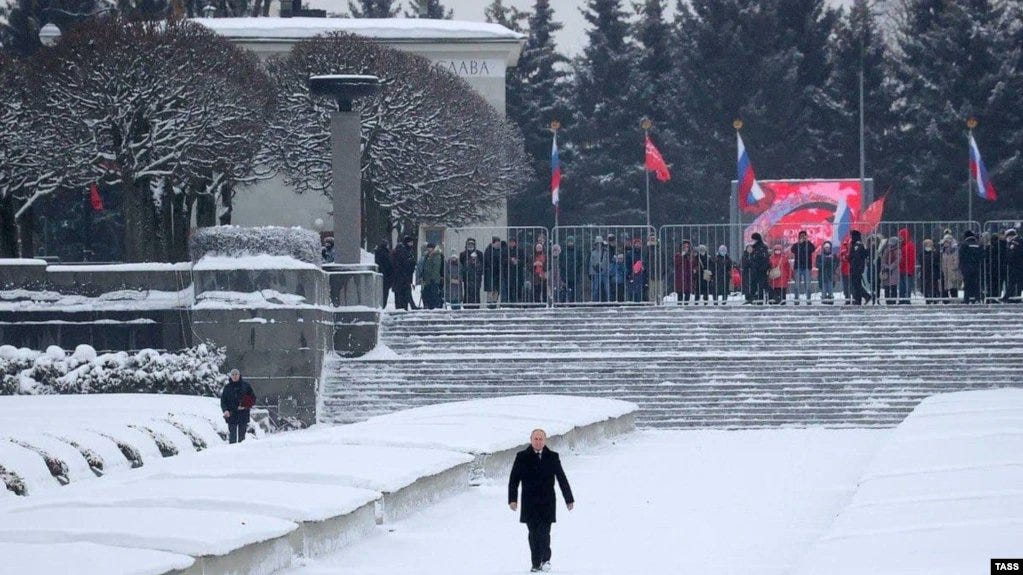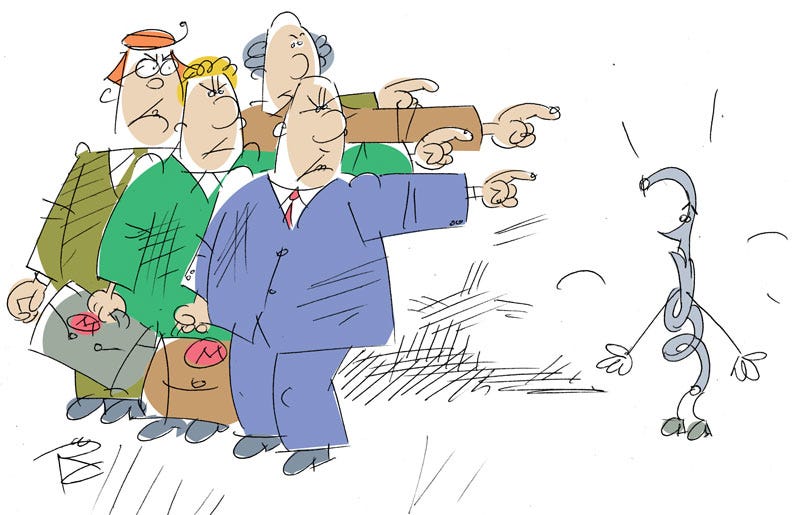He had no time
So far, Vladimir Putin has not taken the time to review written U.S. and NATO positions on security issues, his spokesman Dmitry Peskov said.
“The president has all the papers,” and it will take time to analyze them.
There are and should always be prospects for continued dialogue. It is in our interests and the interests of the Americans. But as for substantive dialogue on those draft documents, there are issues of a different nature, but I will not get ahead of myself.”
According to Peskov, the United States and NATO have outlined the contents of their written answers in such detail that there is no need to make them public, and that the Russian side will not delay with its response. Still, it is unknown whether this response will be provided in written form. He did not offer to venture a guess as to when Russia’s response might follow, recalling that it took the U.S. and its allies more than a month to study Moscow’s proposals.
Russian Foreign Minister Sergei Lavrov traditionally took a more hawkish stance, saying there was no positive response to the vital issue in the U.S. reply.
“As for the content of the document, there is a reaction there that makes it possible to count on the beginning of a serious conversation, but on secondary issues. On the main issue, there is no positive reaction in this document. The main issue is our clear position on the inadmissibility of further expansion of NATO to the east.”
Sergei Lavrov, who has familiarized himself with the documents received, did not get ahead of himself and did not give any forecasts about Russia’s position. There should be no doubt that everything happening in relations between Russia and the West is Vladimir Putin’s game. This scenario is hardly known to anyone except him.
It’s personal
It is well known that for Vladimir Putin, the Great Patriotic War is a significant event. And it’s not just the role the war played in the country’s history. The war has Putin’s “human face”: His father fought near Leningrad, was seriously wounded, and had shell splinters in his leg until the end of his life; his mother went through the complete blockade and lost her other son, who was taken away “under the direct order, to save young children from hunger...for further evacuation” and who fell ill with diphtheritic and did not survive; neither Vladimir Putin’s parents nor he know the date of the boy’s death and place of burial.
So, it should come as no surprise that on the day the siege of Leningrad was lifted, Vladimir Putin came back to his hometown to pay his respects to the victims and, hopefully, to promise himself that there would be no more war.
When the Kremlin decided to formulate its “proposals for security guarantees” and send them to Washington and NATO, I suggested that the primary motive for this behavior was Vladimir Putin’s personal fear of repeating the fate of Milosevic/Kaddafi/Hussein. This fear first became apparent in May 2012, when he was driving to the Kremlin for his inauguration through the deserted streets of Moscow, from which all passersby were kicked out and all cars were removed. However, to a certain extent, we can explain his behavior: It happened the next day after the mass protests in Moscow, which were brutally suppressed by the police with excessive force.
A year and a half after those events, on January 27, 2014, on the 70th anniversary of lifting Leningrad’s siege, Vladimir Putin came to that city and participated in several public events. Then he was not afraid to be near Leningrad residents and walk with them. Yesterday his guards closed the entrance to the cemetery, where several dozen Leningraders stood in the cold so that no one and nothing would disturb him.
Alone walked the national leader, who is supported by two-thirds of Russians, according to official polls. He was overwhelmed with fear of his fellow citizens, who stared at him silently through the fence, expressing no emotion.
He is out of hibernation
Few people in Russia know what former President and Prime Minister of Russia Dmitri Medvedev is doing. As deputy chairman of the Security Council of Russia (which is chaired by President Putin), he has no authority and does not make any decisions. If you type his name into a Google search, over the past six months you will find him as a participant in a couple of events related to the United Russia party, of which he is the formal leader, and an article published under his signature in the Kommersant newspaper about Ukraine and Russian policy toward that country, written in a boorish style.
Therefore, the situation when Dmitri Medvedev is a triple-newsmaker on the same day is quite unusual and raises attention.
First, Medvedev said that creating Russian military infrastructure in Cuba and Venezuela is out of the question.
According to him, both countries are partners of Russia, but at the same time, sovereign states that “seek to break their isolation, to a certain extent to restore normal relations with the United States of America.”
“We can’t place anything with them, even if it was, for example, as it was in Cuba, simply because it has to be consistent with their geopolitical positioning, with their national interests.”
Second, the former President lifted the veil of secrecy and shared the Russian leadership’s plans in a situation where the U.S. would not provide Russia with strategic security guarantees. According to Medvedev, Russia will be ready to remove all constraints on the arms race.
“If such events occur, let’s face it, this is a bad background for extending any treaties. And in this sense, it is impossible to rule out any development in terms of treaty law... Under such conditions, the background for continuing negotiations, let us say, on strategic offensive arms limitation will be extremely difficult.”
Third, Medvedev frankly acknowledged the reasons for the failure of efforts to register Russia’s Sputnik V vaccine internationally.
“[Our country has] weak interaction with international organizations that form modern and recognized by leading countries standards of quality, efficacy, and safety of medicines... This weakens our position in the international arena and hinders the entry of our products into foreign markets... one can complain for a long time about the politicization of some processes, about competition from manufacturers of major drugs, but nevertheless, we need to work with such organizations.”
The crypto battle
Only a day has passed since President Putin instructed the Government and the Central Bank to work out coordinated proposals regarding cryptocurrencies’ future in Russia. It turns out that the Ministry of Finance has its own concept, which has been kept secret until now.
The Ministry rejects the ban and proposes introducing stringent regulation of operations with cryptocurrencies. In addition to identifying cryptocurrency holders (typical for most countries), the Ministry offers to hold cryptocurrency wallets only with Russian banks. The Ministry of Finance agreed with this idea, along with the Federal Security Service and Rosfinmonitoring. All three agencies believe this will allow tax and law enforcement authorities to receive information from crypto exchanges about users; monitor transactions’ chains; and block, seize, and confiscate cryptocurrencies on wallets.
First, we should note that the proposals of the Ministry of Finance do not address most of the risks mentioned by the Bank of Russia (capital outflow from Russia, reduction of investment, impact on the “green transition,” growth of “unproductive electricity consumption”). But these proposals fit well into the system of total control that is being built in Putin’s Russia—the ability to control all transactions with cryptocurrencies is the primary purpose of this concept.
Second, the concept’s authors unwittingly suggest forcing Russian banks to create a system of operations with cryptocurrencies, in addition to money accounts and custody operations with securities. In addition to technical problems, this idea would require legislative regulation of banks’ responsibility for the safety of customers’ crypto funds.
Third, the proposal to give Russian law enforcement agencies the right to block and seize crypto funds is fraught with severe consequences. Russian courts willingly go along with law enforcement, putting aside the concept of a bona fide purchaser and seizing often legally acquired assets. Because every unit of cryptocurrency can be tracked, a Russian court’s recognition of a transaction supportive of extremists could result in the blocking of a particular cryptocurrency unit from its owner, several transactions away.
No sooner had I finished the previous sentence than state agencies distributed a lengthy text in which the press office of the Bank of Russia criticized the proposals of the Ministry of Finance on three points:
1) The Ministry of Finance proposes to build a system of cryptocurrency circulation in Russia like the organized stock and bond market—that is, through a single operator, the role of which should be played by one Russian bank. The Bank of Russia believes that this proposal does not comply with the principles of competition. I would not take this argument seriously because the bank can be replaced—e.g., by the Settlement Center, which settles all transactions on the Moscow Stock Exchange, which does not generate any complaints regarding lack of competition.
2) The Bank of Russia believes that organizing the circulation of cryptocurrencies through Russian banks will mean “the creation of a parallel system, not subject to the usual rules. This could lead to an outflow of funds from deposits, lending in cryptocurrencies, the use of digital currency as collateral, and so on.” I don’t understand the Bank of Russia’s logic. Suppose Russian residents carry out the purchase and sale of cryptocurrencies. In that case, it does not entail an outflow of capital from the country—the funds are transferred from the account of one resident to another. Money may leave Russia if the seller of the cryptocurrency is a non-resident. Still, in this case, the cryptocurrency is no different from the shares of foreign companies, the purchasing of which the Bank of Russia has recently fully liberalized and is not going to ban.
3) The Bank of Russia is sure that the admission of cryptocurrencies to the Russian financial system proposed in the concept of the Ministry of Finance creates a considerable risk to its stability. The Bank of Russia argues that because most cryptocurrencies have no issuer, “the risks of citizens investing in cryptocurrencies will be shifted to Russian financial institutions, and ultimately to their depositors and creditors.” This argument is entirely incomprehensible to me. The existence of an issuer of a financial instrument does not guarantee financial stability and does not prevent risk. We do not have to go far: The default in 1998 shook the entire Russian financial system and led to losses by many investors, although the issuer was well known. In addition, if the responsibility of banks to organize the circulation of cryptocurrencies will be built on the principle of depository operations, then I do not see why and how one can blame the bank in the case of the collapse of any of the cryptocurrencies, or how it will harm its depositors.
In short, the position of the Bank of Russia does not look too convincing to me, but I want to pay attention to the fact it was stated by the press office of the Central Bank. And this means, this time, we hear the position of the top management of the Bank of Russia, not a mid-level official. After that, I understood what made the Central Bank propose to ban operations with cryptocurrencies. The motive is clear to anyone familiar with the principles of bureaucracy behavior—unwillingness to take responsibility for creating a regulatory system that will not work.
Generation gap
Meanwhile, VCIOM conducted a poll on the attitudes of Russians toward bitcoins/cryptocurrencies and imposing possible restrictions.
More than 80% of those surveyed know about the existence of bitcoins, but only 17% said they were specifically interested in the topic and had a good knowledge of what it is. Interestingly, this is almost identical to the share of those who said they wanted to buy bitcoin (16%), although only 4% of those surveyed have made such a purchase. Less than half of those familiar with bitcoin (42%) believe that anyone can buy the cryptocurrency, while 15% are confident that its purchase is prohibited in Russia.
The opinion of those familiar with cryptocurrencies regarding a possible ban split evenly: The shares of positive and negative answers were equal (32% each), while 33% of respondents remained rather indifferent. As often happens in Russian opinion polls, age plays a significant role in determining the position: More than half of the respondents aged 18-34 have a negative attitude toward a potential ban. In comparison, more than half of those over 60 have a positive attitude toward the ban.









